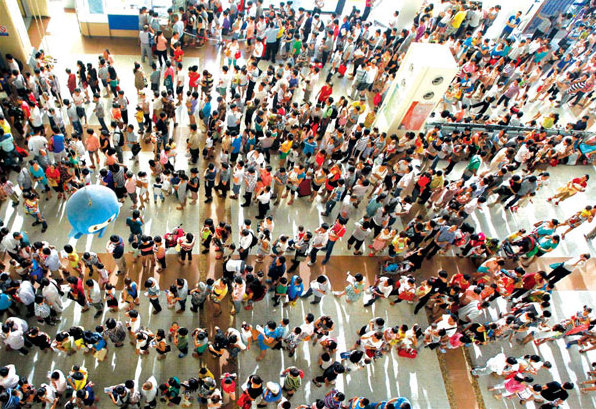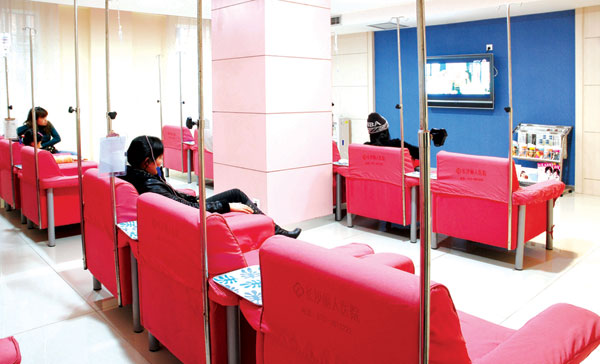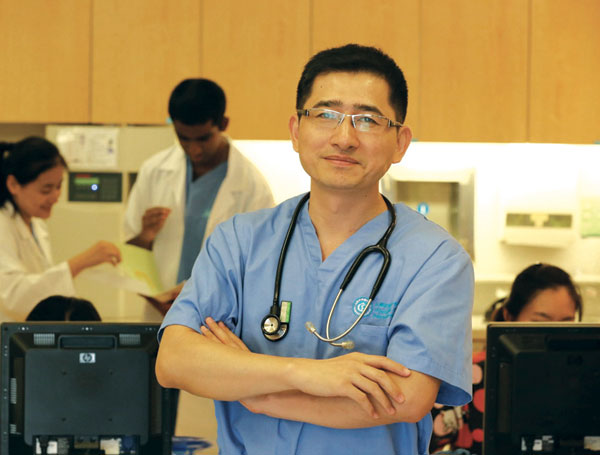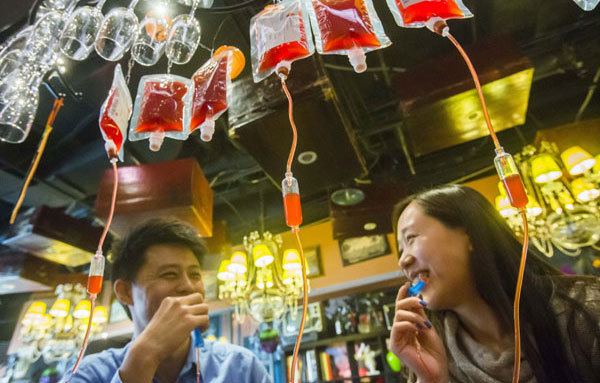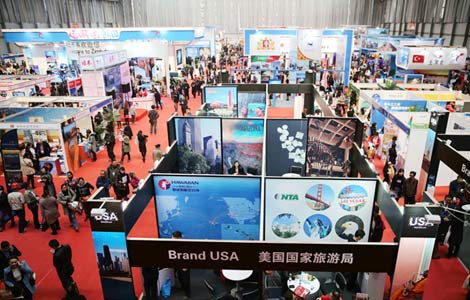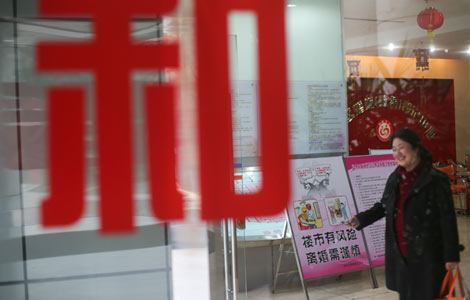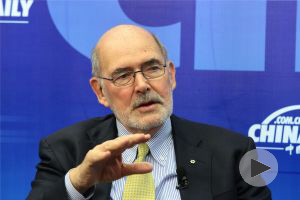Private sector lures more medicos
Updated: 2013-10-30 07:35
By Liu Zhihua (China Daily USA)
|
||||||||
Better pay, job satisfaction and work-life balance are why a number of doctors say they are turning their back on the public hospital system. Liu Zhihua reports.
When Yu Ying, an emergency physician and celebrity on Twitter-like online platform SinaWeibo, announced that she would quit the Peking Union Medical College Hospital, one of the most famous hospitals in China, for a private practice, she probably had not expected the post would be forwarded more than 11,600 times, and get 10,000 comments and 5,000 "like (zan)" clicks.
But the reason she resigned from a much-coveted position in a top public hospital is simple.
|
Parents wait in line in the outpatient service hall at the Children's Hospital of Fudan University, Shanghai. Ding Ting / Xinhua |
|
Patients at a private hospital in Changsha, Hunan province, rest while receiving treatment. CFP |
|
Zhang Qiang says his current practice in the private sector fulfills his wish to be a dignified doctor. Provided to China Daily |
"I was not happy there," Yu says.
She said the performance evaluation and promotion mechanism in public hospitals encourages doctors to focus on scientific research, rather than on patients, and she was also tired of not being able to speak her mind in that environment, Yu explains.
"Besides, I earned too little. People work for money or for interest. I couldn't get satisfied either way, and I left."
Yu is far from alone.
An increasing number of doctors have been leaving the public healthcare system for various reasons, although working in a public hospital, especially in a reputed one, often means lifetime employment.
"I want to be a dignified doctor who treats patients with dignity," says Zhang Qiang, 47, former vascular surgery department director with Shanghai East Hospital, a famous public hospital in Shanghai. He now works at a private clinic.
"After years of effort, I've realized I cannot achieve that under the current public hospital system."
He used to see dozens, and sometimes more than a hundred, patients a day - spending just a few minutes with each - in the noisy public hospital environment, where patients' privacy and comfort was not considered an important issue.
He also had to allocate remarkable time and energy to administrative affairs, such as redundant meetings and paperwork, and could not devote himself fully to treating patients.
In fact, most doctors in public hospitals are under extreme pressure physically, emotionally and ethically, according to Liu Guoen, an economist and healthcare reform specialist with the National School of Development, Peking University.
China has only 2.4 million doctors, which is almost the same number as 10 years ago, for 1.4 billion people, and has largely lagged behind the social need, Liu says.
Besides, doctors are not well paid in the public system and cannot practice freely in other medical institutes to earn money legally, Liu adds.
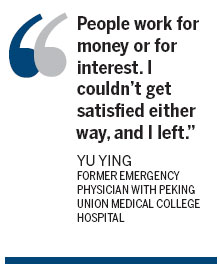
Zhang, the vascular surgeon, says doctors in the public system are overloaded with work, get meager legal income, have few opportunities for promotion, but have to face patients who tend to vent their dissatisfaction and anger on medical staff.
On Oct 25, a patient stabbed one doctor to death and wounded two others in Wenling, Zhejiang province, because he was upset with a surgery on his nose. The patient was later diagnosed with mental health problems.
Most importantly, receiving limited funding from the government, public hospitals have to make money to provide for staff members and hospital development, which causes over-treatment and corruption, and poisons doctor-patient relations, Zhang says.
It is an open secret that to earn extra money, some doctors do work under the table, take bribes from medical companies, and receive hongbao, or money in a red envelope, from patients.
"Now my income comes entirely from my professional service," says Zhang. "Patients visit me as scheduled. They don't need to line up at midnight, and I have sufficient time for each of them."
He sees a much smaller number of patients each day in several medical institutions, but charges more for the service than in a public hospital, and earns good money.
Besides, he now has more time for his family, Zhang notes.
He Qiping, a traditional Chinese massage therapist, 33, was assigned to a reputed acupuncture and massage hospital in Beijing in 2004, but in 2006, he quit and went to Japan for further education. He went to Japan mostly because traditional Chinese medicine (TCM) is well accepted there, and he hoped to broaden his vision.
When he returned in 2011, he noticed there had emerged quite a lot of high-end private TCM clinics in Beijing, and immediately he decided to work for them.
"If I was in a public hospital, probably I would be very busy seeing one patient after another," He says.
"I would be tired, and have no interest in reading or doing something else after work to update knowledge and to improve my skills.
"That is ultimately bad for me and my patients."
However, Wang Shan, president of Peking University People's Hospital, a top public hospital in China, says public hospitals remain the first choice for medical graduates, and few top experts would leave the system.
"Public hospitals have the best medical resources in China, and for fresh graduates, that means the best doctors and experts to learn from, and the best platform to launch a career," Wang says.
In addition, a position in a public hospital is secure employment open to young people only at graduation. It is easy to leave a public hospital, but difficult to go back, Wang adds.
But Pan Zhongying, general-manager of Beijing United Family Hospital, notes that the government is encouraging private investment in the medical sector and quickly developing the social welfare and security system, such as commercialization of medical and pension insurance. That means employment security is not the first thing to consider for a doctor, Pan adds.
"In a private hospital, a doctor makes a living on his communicative and professional skills," Pan says.
"As long as he is good at treating patients, he can live well."
Wang, however, is convinced that top experts who opt out of the public system do so for particular reasons that don't apply to other colleagues.
"After all, public hospitals are still the best hospitals in China," he says.
Contact the writer at liuzhihua@chinadaily.com.cn.
(China Daily USA10/30/2013 page10)
Most Viewed
Editor's Picks

|

|

|

|

|

|
Today's Top News
China's population policy unchanged
Boston victim's scholarship fund reaches $1m
Beckham picks Miami for MLS franchise
UN urges end of US embargo on Cuba
IMAX: Coming to a home near you
SUNY recruits students in China
NSA denies reports on US spying in Europe
US approves chemical probes against China
US Weekly

|

|
